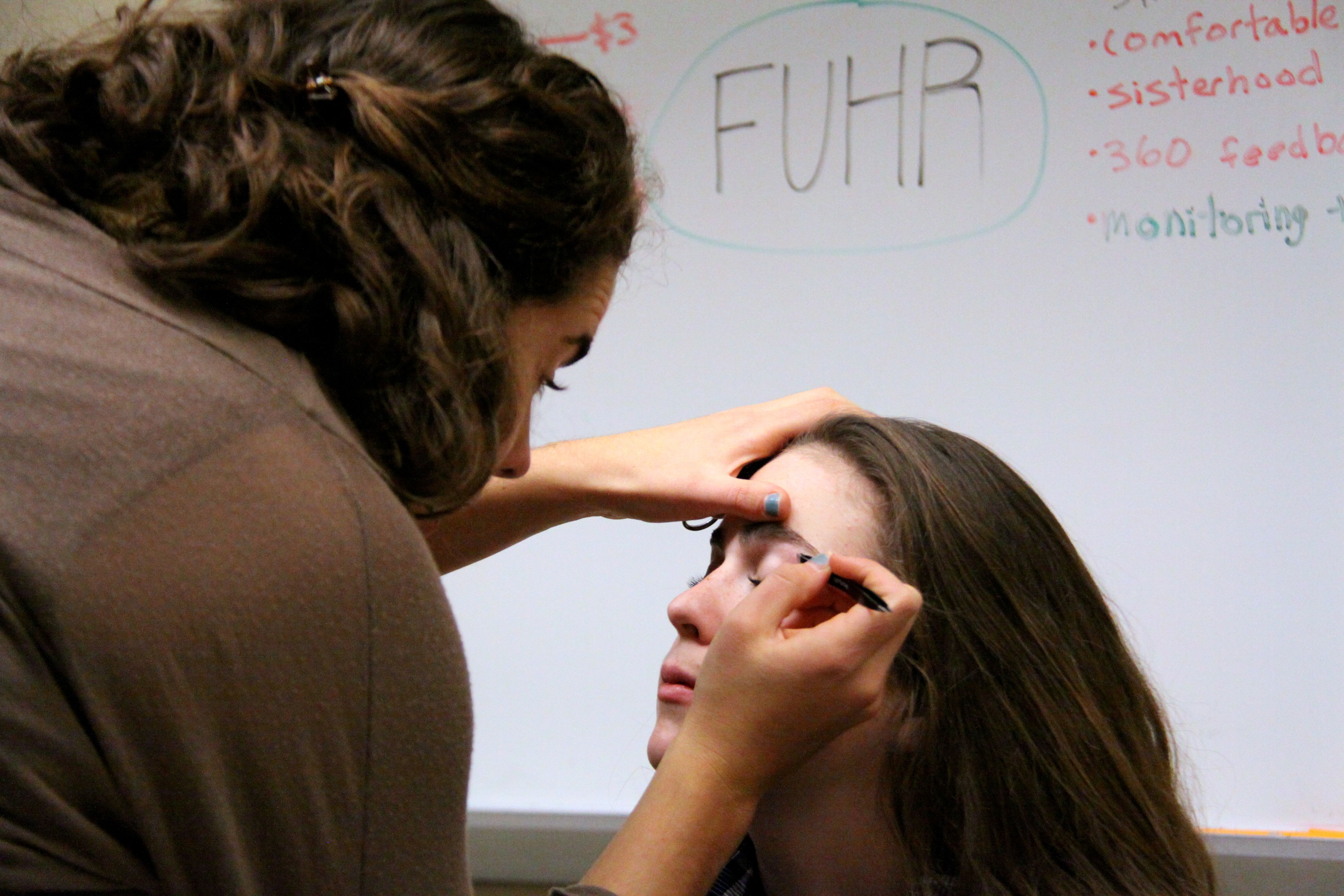
Tufts University junior Lydia Collins, co-founder of FUHR, tweezes a customer’s eyebrows in a study room in the library (Kirk Carapezza/WGBH)
Aspiring entrepreneurs can be found everywhere, including on college campuses. Since many colleges have non-profit status, they don’t allow students to open up shop on campus, pushing many student-run business operations underground.
In a study room tucked away in the back of Tufts University’s Tisch Library, undergraduates Lydia Collins and Bahar Ostadan are getting ready to conduct business. The two juniors say they've chosen this location for a reason.
“We think our houses might be intimidating, and maybe a little sketchy,” said Collins.

FUHR co-founders Lydia Collins and Bahar Ostadan hang a sign outside a library study room to welcome customers (Lydia Emmanouilidou/WGBH)
Inside the study room, a set of tools is lined up on a long table. In the middle of the table sits a Dixie cup filled with cleaning solution to “dip the tools in,” according to Ostadan.
Collins and Ostadan are running FUHR, or Facial Unwanted Hair Removal, a small start up.
There’s nothing fancy about the operation; just tweezers and scissors purchased at the local CVS.
“We have the thinner. The thicker. It really depends on the type of hair,” said Ostadan.
To build trust and attract more clients, Collins and Ostadan are marketing on Facebook and they're only charging customers $3 for eyebrow, lip or chin work.
“People would be paying $25 dollars normally. So our pricing scheme came from us wanting to be generous and make it so people really wanted to come," explained Collins.
Hair removal isn't the only business popping up on this campus. Students have launched a vegan cookie company; started a line of customizable backpacks and sold home-made French fries. And Tufts isn't the only school where students are showcasing their entrepreneurial skills. At Columbia, a student from Newton recently got attention for cooking multi-course meals in his dorm room.
“It’s amazing how much this stuff is out there now. But we shouldn’t be that amazed. That’s where the jobs are and that’s what the young people are interested in,” said Bill Aulet, who manages the Martin Trust Center for Entrepreneurship at MIT.
His research shows nearly 25 percent of college students want to be entrepreneurs, and Aulet says, more than ever before, entrepreneurship is seen as a viable career path.
“And in many ways for the students more exciting than being a lawyer, a doctor, a banker or a diplomat,” he said.
Earlier: Entrepreneurship Emerging As Part of College Curriculums
Administrators at MIT, Tufts and elsewhere say they encourage students to pursue entrepreneurial interests, but all student organizations are subject to university policies that regulate commercial activity. For example, students are not allowed to solicit business and make a profit.
Still, MIT’s Bill Aulet says more liberal arts colleges should teach students how to launch their own businesses properly and legally.
“We’re not an economic development agency. We’re an educational institution. We’re not having them catch a fish here, we’re teaching them how to fish,” said Aulet.
How to fish or, in FUHR’s case, how to remove a unibrow.
Like other student-run businesses, FUHR initially operated underground. But to avoid a hairy situation, last week Collins and Ostadan reached out to administrators, and they learned that to stay in business, they have to donate all their proceeds to charity. FUHR is giving all proceeds to female entrepreneurs in developing countries.
And even though they won’t turn a profit, the two say the experience is still worth it.
“It’s like we made a start-up basically, which I think is a really cool part of it. Learning about the whole process from the start to the end and doing everything has been really fun. Like marketing, service, customer retention,” said Collins.
Those are skills Collins and Ostadan say they can learn best in that study room tucked away in the back of Tisch Library.
Jordan Abosch contributed to this report.










